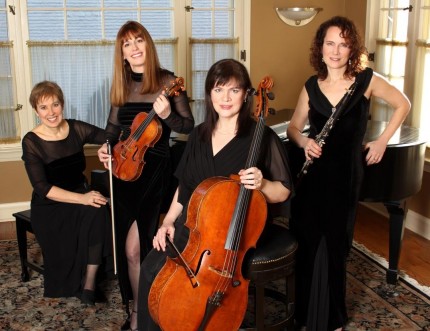American premiere is the highlight of Orion Ensemble’s mixed opener
The Orion Ensemble presented their season-opening program “French and German Tapestries” at PianoForte Studios Wednesday night. A world premiere by an American composer received the best playing of the evening, while performances of familiar European repertoire proved a mixed bag.
Composer Jackson Berkey, perhaps best known for his work as a keyboardist with Mannheim Steamroller, was the odd man out in the program, which also comprised music of Mozart and Fauré. Orion premiered his Homage to Percy Bysshe Shelley. An instrumental version written for Orion of the composer’s choral work Soft Voices, Sweet Violets, & Rose Leaves, which takes as its text Shelley’s posthumously published “Music, When Soft Voices Die.”
The eleven-minute work is in a thoroughly neo-Romantic vein, featuring lush writing for the ensemble of clarinet, violin, viola, cello, and piano. The opening had a sea-tossed murkiness, in which sighing downward figures evoked the loss expressed in the poem. The ensuing dance-like section with staccato accompaniment provided contrasting lightness, and segued into a singing, benedictory episode. This lyricism continued unabated to the coda, which ended in an upwardly spiraling piano filigree. Orion’s performance did justice to the work’s nuances and elegiac expression.
Three Mozart works surrounded the Berkey premiere. Pianist Diana Schmück opened the concert with the Fantasy in C Minor, K. 396. She sensitively probed the work’s dense dissonances, though her rendition was overall a bit square given the improvisatory nature of the work.
Mozart’s mammoth Divertimento in E-flat Major, K. 563 followed with core Orion members violinist Florentina Ramniceanu and cellist Judy Stone joined by guest violist Stephen Boe. A piece such as this can be a thankless undertaking. It requires the utmost precision and sophistication to make K. 563 come across as the work of genius it is; played with anything less it becomes a 45-minute-long opportunity to sound less than one’s best.
Unfortunately the latter was the case in Orion’s performance, in which insecure intonation, periodic technical lapses, and a lack of contrast were the defining characteristics. The evening’s entire program ran almost two and a half hours, and would have benefitted greatly from the simple omission of this work.
Schmück and Boe were joined after the intermission by Orion clarinetist Kathryne Pirtle for the “Kegelstatt” Trio in E-Flat, K. 498, which made for Orion’s best Mozart showing of the evening. The opening Andante had a graceful elegance, Pirtle playing with a cushioned sound well supported by her colleagues. The three players imbued the wandering trio of the Menuetto with a mysterioso quality, and Boe’s viola solo in the closing Rondo was resonantly ardent.
A dedicated reading of Fauré’s Piano Quartet in C Minor, Op. 15 closed the performance. The Orion members were adamant in their repeated iterations of the first movement’s urgent main theme, and the off-kilter galloping of the Scherzo was buoyant throughout. The string players achieved a well-blended sonority in the anguished Adagio, and the emphatic dotted rhythms of the closing Allegro molto were whipped off with gusto.
The Orion Ensemble will be joined by harpist Benjamin Melsky November 22, 29 and December 2. The program includes Ibert’s Trio for Violin, Cello and Harp, Saint-Saëns’ Fantasie in A Major for Violin and Harp, Vaughan Williams’ Six Studies in English Folksong, John Ireland’s Fantasy Sonata, and Frank Bridge’s Phantasie Trio. orionensemble.org/
Posted in Performances





